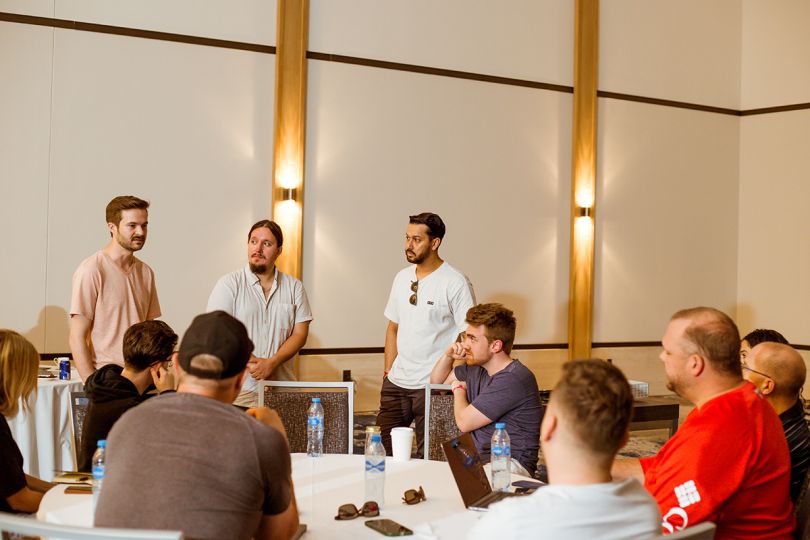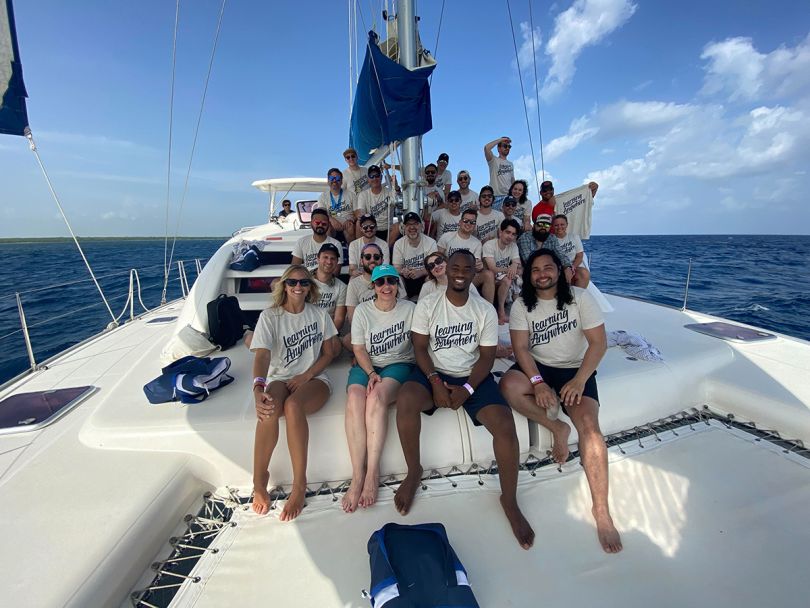For Katherine Darby, a background in musical theater didn’t hinder her ability to join the engineering team at Continu; rather, it improved it.
“I feel like I’m part of the team partially because I have unique experience,” she said.
According to Darby, many of her colleagues also have untraditional professional backgrounds, including Director of Sales Mike Haliczer. When the former jazz musician joined the company, he was struck by its embrace of diverse portfolios and new ideas.
“What mattered the most when I joined the team was that I was given total autonomy,” Haliczer said. “We’re never punished for dreaming here.”
Individualistic people are encouraged to join the company for a reason. Customer Success Manager Matt Carrier said employees aren’t expected to fit a certain mold, which enables them to deliver impactful work every day.
“Here, you’re not just a cog in the wheel,” Carrier said. “Rather, you’re an integral part of the machine.”
EDUCATE ON YOUR OWN TERMS
For Haliczer, Continu’s empowering culture isn’t the only thing that sets the company, which helps users more effectively inspire learning, apart from others in the learning management space. The organization’s platform is an answer to the industry’s reliance on outdated legacy systems, which lack depth and functionality.
Haliczer added that the company’s product has evolved significantly over the years, during which time the organization has gained a deeper understanding of how people learn longitudinally. Leadership plans to further pursue the company focus on tailored, ongoing education moving forward.
“As we grow, we’re going to ensure our users can map the entire journey of a learner while enabling them to upskill,” Haliczer said.
While unique skill sets are essential to driving progress, so are ego-less attitudes. In Darby’s mind, a lack of pride is seldom found in the tech industry yet defines their work environment.
“It’s truly such a supportive team, and I’m very lucky to be here,” she said.
Darby, Haliczer and Carrier describe the unique, evolutionary nature of Continu’s product, the impact of its empowering, growth-focused culture and their excitement for the future.

What sets Continu’s product apart from other similar software in the industry?
Katherine Darby, software engineer: Since we’re a younger company, we’re able to create a product that is suited for modern companies, which really sets us apart. We’ve always been at the forefront when it comes to integration capabilities. Considering Zoom is such an integral part of modern work environments, it’s highly useful. It’s a real game-changer for our product. We’re also working toward developing integrations for other platforms, such as Microsoft Teams.
Mike Haliczer, director of sales: We’re always trying to be ahead of the curve. Learning is dynamic. Something new will come up tomorrow that we didn’t know today. It’s better to be ahead when technology and the learning space changes so quickly. Being within that window has helped us succeed, especially with forward-thinking companies.
How have you seen the platform transform over the years to meet customers’ evolving needs?
Haliczer: Learning management tools are mostly created for compliance and transactional learning. For every kind of click-through module people participate in, whether it’s related to harassment or bribery, they never have people cheer them on as they go through it. These types of learning modules are undoubtedly super important, but they’re more transactional. The way people learn has changed significantly. Organizations can now build a learning-based culture not just to actualize employees, but to increase retention and ensure education is a core pillar of their environment. To accomplish this, many businesses use clunky legacy systems that do everything. They may have all the bells and whistles, but they’re dinosaurs. No one enjoys using them, yet they check the boxes.
In order to help companies build a culture of learning, we give them an easy-to-use and robust way to deliver education. Our product has evolved significantly over the years, including during the time that I’ve been here. When I joined the company, we were more focused on informal and discoverable learning. Over time, we began to understand the longitudinal process of how people learn. We’ve also doubled down on the concept of blended learning, or combining in-person and online education.
What is the importance of supplying both internal and external education while facilitating blended learning?
Matt Carrier, customer success manager: Our platform takes any type of learning, whether it’s cross-departmental or external, and creates a central hub of education, due to its segmentation properties. Our customers can bring in external or internal users, and we’ll supply the appropriate information for them. A lot of systems have a ton of information that may or may not be useful to the learners, which makes the experience feel like a chore. People don’t want to spend time figuring out what they need to know. We empower administrators to do that for their learners. We then combine that tailored learning with additional content that people might want to explore in order to grow either personally or professionally. Our users can pair remote learning with in-person training and can leverage their existing systems, whether that’s SharePoint or Google Drive, and connect them with our native tools. In this way, administrators can give their learners the educational experience that works for them.
How does the company help drive user engagement and create an environment of learning and improvement?
Haliczer: A large amount of education doesn’t have to be mandatory. Many other learning experience platforms will deliver more informal learning by giving people access to 4,000 courses. Yet enabling people to choose from one of thousands of courses isn’t solving the problem. Engagement happens when a company offers people a tailored approach that gives them the autonomy to learn in a way that works best for them. If you give people too many options, not only will they be confused, but they’re more likely to be unsatisfied with the end result. We aim to give people a sense of ownership while enabling administrators to offer a structured approach.

How does a cohesive culture foster a focus on internal development?
Carrier: If you have a question, you can reach out to anyone at the company. Everyone is willing to help out to answer questions. We do this primarily through global collaboration tools, considering we have a globally-distributed workforce. Additionally, we get paired with a new team member to connect with every week. We have a warm, welcoming and compassionate culture. Employees are encouraged to learn, and we have such diverse skill sets across the company.
Darby: There is a push for connection, since we are a remote company, and I’ve always appreciated that. If you ever have a question, there’s always someone there to answer it. In terms of the engineering culture, we’re currently updating a lot of the platform and working on building internal tools. It’s an incredible opportunity for us to learn, and we always have support and resources to help us continue our education. We’re interested in hosting a mini hackathon to work on internal tools, which I’m really excited about.
Haliczer: On the sales team, we use a revenue intelligence platform. Every Friday, we’ll have team members submit a call recording, and they’ll discuss their reasoning and approach. We’ll have a really friendly discussion about it and offer suggestions, encouragement and feedback. It’s a great way for us to not only empower team members, but also garner different perspectives. We’ll also take part in roundtable discussions to talk about different product functionalities surrounding various sales processes and tools we’re considering using. We have an open-door policy for ideas in general. This is a great way for people to share their voices regardless of how long they’ve been at the company.
“Administrators can give their learners the educational experience that works for them.”
What role have leaders played in your professional development?
Haliczer: I joined the company as a business development representative. As a junior employee, I worked side by side with our CEO. He didn’t care that I was new to the company and lacked experience in certain areas. He was always bringing me into the fold and jumping on calls. There’s no sense of being above a task. People are always happy to share expertise when they can, which is a mentality I encourage.
Darby: I work really closely with my direct manager to set specific goals. We use our platform to decide where we want to be next and what we should be working on. Additionally, our engineering mentorship program is exceptional. I join calls with senior engineers all the time. We have designated time every other week to talk about our goals and areas that need improvement. It’s been incredibly helpful, and I’ve grown so much as an engineer during my time here.
Carrier: My supervisor is always asking me, “What do you want to know more about, or how do you want to learn new things?” We’re always encouraged to build from within, as knowledge leads to growth. I’ve asked a million questions since I’ve been here, and I’ve never had anyone tell me they couldn’t share information with me.
What are you most excited to accomplish with your teams over the next year?
Darby: We’ve been exploring the benefits of gamification on the platform. We’re working on fun ways to foster growth through various features, such as leaderboards, point systems and badging, in an effort to encourage learning outside of what’s required. It would be like riding a Peloton and learning something new at the same time.
Carrier: We’re focused on bringing our vision home. We do a great job of selling success. Our goal is to continue growing the team in the fashion that we have been by finding more smart, caring people.
Haliczer: I’m most excited about building a world-class sales team. We obviously want to increase revenue, yet we’re mostly focused on developing an empathetic team that understands that their purpose isn’t to get commission checks. An important aspect of what we do here is that we don’t just sell a product; we sell our vision, which is to improve people’s lives. As we continue to scale the sales team, we attribute a large degree of our success and growth to having highly compassionate, knowledgeable people. We want to ensure that every person who joins our team embodies these characteristics. It’s important that we retain the magic that brought us here today.








